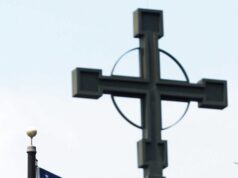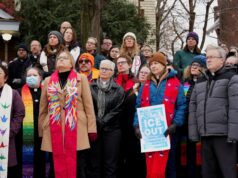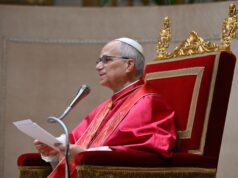
President Donald Trump and law enforcement officials said Sept. 12 they had a suspect in custody in connection to the fatal shooting of conservative activist Charlie Kirk Sept. 10 during an event at Utah Valley University in Orem, Utah.
A staunch ally of Trump, Kirk was the founder of the Republican-aligned Turning Point USA. He was being hosted by that organization’s chapter at the university for his “American Comeback Tour” when he was killed. Kirk was reportedly in the midst of discussing mass shootings in the U.S. with an individual attendee when a single shot rang out, striking Kirk and scattering the crowd.
Law enforcement officials carried out a manhunt for the alleged shooter until he was turned in, Trump said in a live interview on Fox News.
“With a high degree of certainty, we have him,” Trump said.
“Somebody close to him,” Trump said, “essentially went to the father, went to (a) U.S. Marshal who is fantastic–and the person was involved with law enforcement but was a person of faith, a minister–and brought him to a U.S. Marshal, who is fantastic and the father convinced the son, this is it.”
Law enforcement officials named Tyler Robinson, 22, of Utah, as the suspect.
Utah Gov. Spencer Cox, a Republican, said at a press conference, “We got him.”
Cox said the shooting was a political assassination, but he did not shed light on what authorities believe the alleged shooter’s motive may have been.
Trump said if the suspect is found guilty, “I hope he gets the death penalty. Charlie Kirk was the finest person, he didn’t deserve this, he worked so hard and so well. Everybody liked him.”

The Catholic Church’s official magisterium opposes the use of the death penalty as inconsistent with the inherent sanctity of human life, and advocates for the practice’s abolition worldwide. Pope Francis revised the Catechism of the Catholic Church in 2018 to clarify the church’s teaching that capital punishment is morally “inadmissible” in the modern world. In his 2020 encyclical “Fratelli Tutti,” the late pope cited St. John Paul II, writing that his predecessor “stated clearly and firmly that the death penalty is inadequate from a moral standpoint and no longer necessary from that of penal justice.”
When asked by Fox and Friends’ co-host Ainsley Earhardt, “How do we fix this country? How do we come back together?” and about “radicals on the right and left,” Trump replied, “I tell you something that is going to get me in trouble, I couldn’t care less. Radicals on the right are radical because they don’t want to see crime.”
Trump proceeded to claim “radicals on the left are the problem,” and called illegal immigration the “worst thing.” He repeated his previous unsubstantiated claim that 25 million people were let in from countries that emptied “their prisons into our country,” claiming the same about mental institutions and insane asylums.
“They empty out insane asylums into our country by the millions, it is the hardest thing,” he said.
Utah’s Republican governor, however, emphasized that it was important for Americans to address political violence before it spreads like cancer, and to build a new society capable of having hard conversations.
“Political violence is different than any other type of violence, for lots of different reasons,” he said, explaining that it “makes it more difficult for people to feel like they can share their ideas, that they can speak freely.”
“We will never be able to solve all the other problems, including the violence problems that people are worried about, if we can’t have a clash of ideas safely and securely … especially those ideas with which you disagree,” he said.
“That’s the problem with political violence, is it metastasizes, because we can always point the finger at the other side; and at some point, we have to find an off-ramp, or it’s going to get much, much worse,” he added.
In comments directed to young people, Cox urged them to take the “opportunity to build a culture that is very different than what we are suffering through right now, not by pretending differences don’t matter, but by embracing our differences and having those hard conversations.”
Catholic bishops and other officials called for prayer in the wake of Kirk’s shooting, with some also expressing concern about other recent instances of violence, including a shooting at Colorado’s Evergreen High School the same day, and the Aug. 27 mass shooting at Annunciation Catholic Church in Minneapolis that killed two schoolchildren and injured 21 others.
“What we see unfolding in our nation is a vicious pattern of hatreds rooted in the rejection of God, of the dignity of the human person, and the sanctity of the family,” Bishop Michael F. Burbidge of Arlington, Virginia, said in a statement in the aftermath of Kirk’s assassination. “We can eradicate these ills only through a firm reliance on God, through a deeper devotion to Christ and the Gospel, through a sincere love for persons reflected in law, and through a renewed commitment to justice and public order.”
He added, “We are living through a perilous moment. Our challenge is not only one of partisan disagreement, law, and policy, but in a deeper way our challenge is to uphold the central goods of American political life: of faith, of families, and of a national commitment to live together in harmony as brothers and sisters.”








